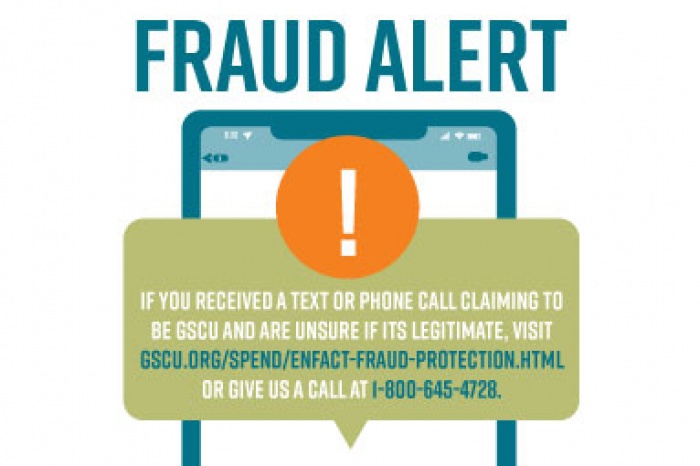
Reminder: DO NOT give out your OnLine Banking credentials or debit card information.
Fraud
Our members' online security is of the utmost importance to us.
At Granite State Credit Union, we're committed to providing members with the most up-to-date notifications and education to protect our members' confidential information. Each year, fraudsters steal billions from unsuspecting people. These criminals use a variety of methods to steal confidential information and funds. Protect yourself and your loved ones by educating yourself and sharing tips with your friends and family!
If you experience suspicious or fraudulent activity, contact us: 1-800-645-4728.
"Whenever I have a question or suspect fraud could be involved, Granite State Credit Union handles the situation immediately. I'm impressed how hands-on they are with their members."
Member Testimonial

Protect Yourself & Others
- Never give out login credentials over the phone, in person, or via email.
- This includes your user names and passwords.
- Watch what you’re sharing on social networks. Criminals can befriend you and easily gain access to a shocking amount of information—where you go to school, where you work, when you’re on vacation—that could help them gain access to more valuable data.
- If someone calls or emails you asking for sensitive information, it’s okay to say no.
- You can always call the company directly to verify credentials before giving out any information.
- Be sure to monitor your accounts for any suspicious activity. If you see something unfamiliar, it could be a sign that you’ve been compromised.
- ATM, Credit, and Debit Cards or Checks should be signed as soon as they arrive and only used for transactions in a secure setting (not on unfamiliar or suspicious websites).
- Do not utilize the “remember my card number” options on websites.
- Do not leave the cards out in visible, unsecured locations.
- Call us to immediately report a missing or stolen card.
- Tamper resistant checks are available through GSCU and utilize security features such as chemically sensitive paper to deter alterations.
- Statements, e-statements, bills and e-bills should be reviewed promptly upon receipt to verify that all transactions were made by authorized parties.
- Any transactions made by unauthorized parties should be reported to the appropriate financial institution, card issuer, or biller.
- Statements, bills, and transaction receipts that are to be discarded should be eliminated securely, for example by shredding, and should not be discarded in a readable form.
- Practice good password management by utilizing a strong mix of characters.
- At least 8 characters long.
- Avoid common words and phrases.
- Don't use personal information.
- Don’t use the same password for multiple sites.
- Don’t share your password with others.
- Don't write it down.
- Don't reuse past passwords.
- Use two-factor authentication when possible.
- Never leave your devices unattended.
- If you need to leave your computer, phone, or tablet for any length of time—no matter how short—lock it so no one can use it while you’re gone.
- If you keep sensitive information on a flash drive or external hard drive, make sure to secure it as well.
- Use strong passcodes or utilize biometric verification methods such as FaceID and fingerprint scanning.
- When using public Wi-Fi, refrain from sending or receiving private information.
- Use virus protection software on all computers connected to the Internet and ensure it is updated regularly. Most commercially available security software provides anti-virus, malware and firewall protection.
- Keep all applications, including your operating system patched, by setting your PC to automatically install updates.
- Turn off your computer or disconnect from the network when not in use. An intruder cannot attack your computer if it is turned off or disconnected from the network.
- Back up your data regularly.
- Be conscientious of what you plug in to your computer. Malware can be spread through infected flash drives, external hard drives, and even smartphones.
- Report any suspicious messages claiming to be GSCU to us: 1-800-645-4728.
- Report any other suspicious messages to the Federal Communications Commision and Federal Trade Commission
Recent Member Alerts
-

Fraud Education: Safe at Home
October 01, 2024 | NewsLearn all about home title fraud in this month's Fraud Education article!
-

Fraud Education: What is Credit Piggybacking?
September 20, 2024 | NewsLearn how to protect yourself from credit piggybacking in this month's Fraud Education article!
-

Fraud Education: Alert or Freeze
May 08, 2024 | NewsLearn the difference between fraud alerts and credit freezes in this month's Fraud Education article!
-

Fraud Education: Understanding Statement Details
March 20, 2024 | NewsLearn what you need to know about your credit card statement in this month's Fraud Education article!
-

Don't Gift a Scammer!
January 19, 2024 | NewsThe holiday season leads to an increase in consumer spending and fraud.
Remain vigilant by following these fraud prevention tips and remember—GSCU will never ask for unsolicited personal information such as your card number, PIN, OnLine or Mobile Banking credentials, or one-time passcode. Only members calling into GSCU will be asked for personal information to verify their identity.
-

Fraud Education: Recovering from Identity Theft
June 05, 2024 | NewsLearn tips for recovering from identity theft in this month’s Fraud Education article!
-

Fraud Education: How to Protect Yourself from Home Title Fraud
April 18, 2024 | NewsLearn how to protect yourself against home title theft in this month's Fraud Education article!
-

FBI Announces Nationwide 'Take A Beat' Campaign to Increase Awareness of Frauds and Scams
August 28, 2024 | NewsLearn tips to protect yourself, plus how to report fraud to your local FBI office and submit a complaint to the Internet Crime Complaint Center (IC3)!
-

Fraud Alert (8/16/24)
August 16, 2024 | NewsPlease be advised that there are two recent reports of fraud pertaining to the following: Electrical Company Scams & Antivirus Scams
-

Fraud Education: How to Protect Yourself From Cyber Attacks
August 07, 2024 | NewsLearn how to protect yourself from cyber attacks in this month's Fraud Education article!
-

Phone & Impersonation Scams
March 28, 2024 | NewsPhone and impersonation, or spoofing, scams are becoming more prevalent. Generally, the common advice was to avoid phone scams and by only picking up calls from numbers you recognize. However, fraudsters are always finding new ways to target and are now spoofing phone numbers you may recognize.
-

Be Wary of Fake Family and Grandchildren Emergency Scams
February 01, 2023 | NewsMany scams revolve around the idea of a family emergency, often a distraught grandchild calling, to build urgency and apply pressure to victims. Frequently, these scams target senior citizens with the fraudster contacting the victim noting they’re a family member or close friend.
-

MEMBER NOTICE (11/10/2023): Spoofing Fraud Trend
January 19, 2024 | NewsWe have been made aware of a spoofing fraud trend that is affecting our members. See this blog to learn more.
-

MEMBER NOTICE (1/17/2023): Spoofing Fraud Trend
January 18, 2023 | NewsWe have been made aware of a spoofing fraud trend that is affecting our members. Spoofing is when a fraudster falsifies the information transmitted to your Caller ID to disguise their identity...
QUICK RESOURCES
Fraud Terminology
- Anti-virus Protection – computer software used to prevent, detect, and remove computer viruses
- Firewall Protection – software programs designed to protect a network by preventing unauthorized users from gaining access
- Fraudster – a person who uses computers to gain unauthorized access to data
- Keyloggers – a type of malicious software designed to track every keystroke and report it back to a fraudster
- Malware – software that is intended to damage or disable computers and systems
- Man-in-the-middle – when a fraudster or compromised system sits in between two uncompromised people or systems and deciphers the information they’re passing to each other, including passwords
- Ransomware – malware that encrypts the files on your computer and then holds for ransom
- Romance Scam – fraudsters feign romantic intentions, gaining the victim’s trust and using that to get the victim to send money
- Social Engineering – the act of obtaining secure data by conning an individual into revealing secure information
- Virus – a piece of code that is capable of copying itself and typically has a detrimental effect
GSCU's Secure Message Center
To ensure the confidentiality of private information sent via email and comply with privacy laws, Granite State Credit Union utilizes an email encryption service. All you need is an Internet connection, a web browser that supports 128-bit SSL encryption, and a Granite State Credit Union Secure Email account. To help protect your privacy, if you should need to send personal account information, such as your member number or Social Security Number, to the credit union, we recommend using our Secure Message Center.

Types of Scams
Common scams range in style, content, and purpose such as "romance" scams on dating apps or "grandparent" scams targeted toward seniors. Most of these scams have common signs that they are fraudulent.
Common signs to consider:
- If an offer seems too good to be true, it most likely is.
- Be cautious with any message offering to place money into your bank account.
- Is there a sense of urgency in the message?
- Are consequences noted if you don't act quickly?
- Is the message asking you to provide or update personal information?
- Social Security Number
- Bank Account Details
- Passwords
- Requesting payment through unconventional means.
Fraudsters send emails appearing to be from someone you know or a reptuable organization in an effort to gain personal information from unsuspecting victims.
How to spot a phishing email:
- Check for spelling mistakes and grammer errors within the email.
- Review the "From", and "To", areas within the message.
- Hover your mouse arrow over the name in the "From" column. By doing so, you will be able to tell if the email is from a recognizable domain that is linked to the actual sender name.
- If you notice that your email address is being identified as the "From address", this is a sign of a fake email message.
- Be wary if the "To" field reflects a large list of recipients. Legitimate emails will be sent directly to you and you only.
- You may see “undisclosed recipients” and this is something to keep an eye on as well. It could be a valid send, but double check by using the other tips identified.
- Pay attention to the email in the reply field. Does it match the sender of the original email?
- Most legitimate messages will be a mix of text and images. A poorly constructed phishing email may be missing images, including the company’s logo. If the email is plain text and looks different than what you’re used to seeing from that sender, go with your gut feeling and delete the message.
- Be careful when clicking on attachments or links in email.
- If it’s unexpected or suspicious for any reason, don’t click on it.
- Double check the URL of the website the link takes you to.
- Roll the mouse pointer over a link to reveal its actual destination before clicking on it.
- Make sure the link uses encryption (https://).
- Is this the first time the sender has included an attachment? Most organziations will not send out attachments via email.
- High risk attachments file types include: .exe, .scr, .zip, .com, .bat.
- It is a recommended best practice to always open a new window and go to the site directly without using the email link provided in an email.
Criminals attach a card-skimming device to an ATM or payment processing terminal to steal card information. This can be done with skimmers that read the magnetic strip or computer chip on the card, small cameras to record finger movement when entering passwords, electronic equipment directly installed into the ATM or payment terminal, or an overlay device on top of the keyboard area to record PINs.
Machines in public areas such as airports, gas stations, or stores are the most vulnerable.
How to protect yourself:
- Check all ATMs and other card-reading devices before use.
- Use ATMs inside buildings or in high-traffic areas that are harder to target.
- Opt for credit (or use your debit card as credit) to prevent access to your PIN.
- If an ATM looks suspicious, don’t use it. Report it to the bank or police.
Smishing combines the terms "SMS" and "phishing" to represent phishing scams presented through text message rather than email formats. A fraudster can disguise a text message to also appear to be from a trusted source.
How to spot a smishing text:
- Verify the source (email, phone number, etc.) by comparing to prior messages or finding the correct number on the source's website.
- Consider the tone of the message and be wary of:
- A sense of urgency
- A need to act quickly
- Dire consequences
Fraudsters make their phone number appear on Caller ID to be a trusted organization. These scammers use an automated dialing software to set up these calls and millions are made over the internet in a matter of minutes.
How to protect yourself:
- Utilize robocall blocking.
- Talk to your phone provider to learn more.
- Consider adding your phone number to the "Do Not Call" list.




